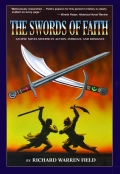Books-Into-Movie Commentary: Gulliver’s Travels January 25, 2011
Posted by rwf1954 in books, books into movies, Gulliver's Travels, Jonathan Swift, movie commentary, movies, movies based on books.Tags: book commentary, books, books into movies, Gulliver's Travels, Jonathan Swift, movie commentary, movies, movies based on books
trackback
(Richard Warren Field wrote the award-winning novel,
The Swords of Faith. Read why this book will make a great movie.)
Once upon a time (a few weeks ago), I was writing a blog called “Books-Into-Movies.” I have since then discontinued that blog. But before I did, I started reading Gulliver’s Travels by Jonathan Swift, in anticipation of the upcoming movie of the same name. This book was published in 1726. I have to say, the book surprised me—the writing style is tough and dated, but the content is entertaining and still relevant. I laughed out loud in places when reading it.
It doesn’t appear that “Gulliver’s Travels” will be a big hit movie. Critics are generally panning it. But I have to comment about this book. The movie critic from my local paper wrote that the satire in Gulliver’s Travels is outdated. I could not disagree more! As if to compound these errors in the popular culture, Book of the Month Club offered Gulliver’s Travels as a selection for children! Some of the fantasy elements of Swift’s story are fun for children, but this is decidedly not a children’s book! As I discuss details of the book below, my assertions will become obvious.
I write these words after reading the book but before seeing the movie. I’ll add a comment at the end of this post about the movie, but most of my comments will be about this wonderful book.
Two surprises:
- When we think of Gulliver’s Travels, we think first of Lilliput, the Lilliputians—big, huge Gulliver among a bunch of tiny people. We might also think of the reverse scenario on his journey to the Brabdingrab—tiny, tiny Gulliver among a bunch of huge people. But these two “travels” are only half of this book. Some of my favorite parts of the book are from the second half; the island in the sky, and the land of the horses.
- When we think of English literature classics, we think of stuffy proper people, and slow-moving dramas. Gulliver’s Travels is full of action, and contains numerous crass and vulgar (also hilarious) moments. I will be interested to see how many of these get into the movie starring Jack Black. I give examples of these as well.
Part I: A Voyage to Lilliput
- Here is the Gulliver’s Travels story known to everyone. Gulliver wakes up after a shipwreck tied up by a swarm of people six inches tall. This is a high-concept idea, with many options: allegory, pure adventure, satire—Swift plays it for satire.
- Swift skewers religious fanaticism, an issue alive and festering today. The state of Lilliput and the state of Blefuscu are in a state of war over religious differences. The specific controversy is over which end of the egg to open up, the small end or the big end. The government of Lilliput considers “Big-Enders” to be heretics.
- In one of those great examples of crassness and vulgarity, Gulliver puts out a fire in the Empress’s palace by urinating on it. It does not appear to Gulliver that the citizens, with their thimble-sized buckets, will be able to put out the fire. So, he uses a natural hose to snuff out the flames.
- Gulliver’s own abilities lead to big troubles. It is against the law to urinate in the Empress’s palace. This, coupled with Gulliver’s lack of enthusiasm for helping Lilliput’s military efforts to reduce Blefuscu to a province—in Gulliver’s mind consigning free and noble people to slavery—gets Gulliver accused of treason. They decide not to kill him; they ask that he report in three days to have his eyes put out. Gulliver defects to Blefuscu, then quickly leaves the lands of the six inch high people.
Part II: A Voyage to Brobdingnag
- He’s a little guy here—a Lilliputian among giants—role reversal. In this world, he holds no power, and struggles to survive, mainly from the threat of being killed by the casual negligence of the huge humans he deals with, and the ambitions of oversized creatures like rats and household pets.
- At first he’s exploited for profit by the farmer who finds him, and nearly driven to fatal exhaustion in the process. The farmer sells Gulliver to the king when Gulliver appears to be losing his health. Only the farmer’s daughter, a young girl under ten, seems to care about his welfare. She joins the king’s service to continue taking care of him after the sale.
- When Gulliver describes the customs of English nobility, and some of the history, the King concludes “by what I have gathered from your own relation… I cannot but conclude the bulk of your natives to be the most pernicious race of odious little vermin that nature ever suffered to crawl upon the service of the earth.” Gulliver takes exception, but we get the idea that Swift agrees with much of the sentiment of the ruler of Brobdingnag.
- Gulliver proposes to help Brobdingnag’s king manufacture guns and gunpowder, technology they don’t have. “The King was struck with horror at the description I had given of these terrible engines…” He describes the King as “amazed how so impotent and groveling an insect…would entertain such inhuman ideas…” Gulliver again finds this ruler’s ideas “narrow”—shortsighted and naive.
- But the King seems insensitive to Gulliver, treating him like a pet, hoping to breed him to start a line of tiny humans, only held back by his inability to find a female partner for Gulliver. Gulliver escapes in a box with a makeshift sail.
Part III: A Voyage to Laputa, Balnibarbi, Luggrigg, Glubbdubdrib and Japan
- Gulliver visits an island in the sky, a place little concerned with practicalities. Every aspect of this world seems based on abstract applications of geometric shapes. The ruling king seems little interested in anything related to practical reality.
- Gulliver visits an academy with some very strange projects. He enters a room with a horrible stench. The academic in that room gives Gulliver a warm welcoming hug, a hug Gulliver can do without. This man’s project? Turning excrement back into food. He has not yet perfected the idea.
- In another room, mathematical formulas are inscribed on paper-like wafers, and fed to students in an effort to have the students absorb the mathematical concepts more quickly. This project is also far from success—the students keep vomiting out the wafers.
Part IV: A Voyage to the Country of the Houyhnhmns
- The Houyhnhmns are horses. This society is run entirely by horses. This is the Planet of the Horses a few centuries before Pierre Boulle’s Planet of the Apes. Humans (known as “Yahoos” in this society) are brutal, base creatures—filthy disgusting, and utterly without sophistication or higher reasoning power. The Houyhnhmns are baffled by Gulliver, who clothes himself and exhibits so many advanced traits. And they find it doubtful that an advanced society run by Yahoos could exist, or that that society could possibly treat Houyhnhmns in any way subservient to Yahoos. But when Gulliver relates the details of human society—contemporary society and through human history— the leader of the Houyhnhmns experiences the grim realization that Gulliver’s description of his society is consistent with what Houyhnhmns know about Yahoos.
- Gulliver, who has an extraordinary aptitude for languages, struggles with the nays, brays and whinnies of the language of the Houyhnhmns, but he does master it over his three years with them. When he returns to England, his speech retains a Houyhnhmn accent; horse-like tones become part of his normal vocal patterns.
- Gulliver finds it hard to return to human society after his time with the noble horses, creatures who don’t even have a specific word for lying. He finds humans/Yahoos disgusting—even his wife has to sit at the “far end of a long table” for him to agree to dine with her. He ends the book implying he never wants to experience the company of humans again.
With this, Swift brings his biting, satirical look at humanity to a close, clearly not an admirer of the species! The first three journeys examine different human worlds, with strange scenarios, but leading each time to some form of failure due to perceived deficiencies of human nature. It is only the society encountered during his fourth journey that Gulliver experiences any admiration for. Swift is clearly a cynic, not hopeful about basic human nature, or the ultimate fate of the human species. That gives his wonderfully creative stories a modern edge.
But, I don’t share Swift’s apparent sentiment. We can find our better natures, as opposed to our worst, and progress close to the noble society Swift describes in Part IV. And, maybe that’s what Swift really wanted to do—keep us thinking about our deficiencies while dreaming of what we can be. We Yahoos have the choice!
——-
These comments are written after I have seen the movie:
- I think Jonathan Swift would have liked this movie. No, the movie did not follow the book much at all. But Swift’s Gulliver’s Travels is a book with a sense of humor, and the movie retains the comic tone. At the end, the ensemble songs-and-dance, with the people of Lilliput and Blefuscu singing “War” captures Swift’s themes of social commentary.
- In my opinion, the critics were too hard on this film. Was it a great masterpiece of film-making, turning a great classic of English literature into a classic film? No. But the film takes some high concept ideas from the book and turns them into an hour and a half of entertainment that offers some smiles, chuckles, and even a few good laughs.
How does the book compare to the movie? This is a movie that takes concepts, and little else, from the original book. I will not attempt a comprehensive comparison and contrast. I’ll list a few observations:
- Lemuel Gulliver in the book is a ship surgeon and later a Captain, a sophisticated man, educated and eloquent. (In the movie, he’s a loser in the mailroom of a newspaper.)
- In 1726, Jonathan Swift does not need to call on the Bermuda Triangle to take the story to exotic lands. Back at that time, parts of the globe had not been explored.
- There is no showdown scene in Lilliput between Gulliver and a machine to run by an antagonist. There’s no happy reconciliation between Lilliput and Blefuscu. Gulliver leaves the area for England, and both factions are glad to see this oversized consumer of resources gone.
- In the book, we do not have any romantic story, nothing like the princess and the commoner in Lilliput, or Gulliver’s own romance with the travel editor at the newspaper. Gulliver is married with a family, though we are left to wonder how his wife and family feel about his long absences.
- Gulliver’s personal journey is different in the book. He becomes disgusted with humanity, particularly after his stay with the Houyhnhmns. In the movie, the journey is simpler, more mundane—he finds himself and his love mate, becoming a travel writer himself.
But I believe someone in connection with this movie was quite familiar with the book:
- Gulliver urinating to put out a fire is straight out of the book, and representative of Swift’s humor throughout Gulliver’s Travels.
- Gulliver’s gathering of the enemy fleet, and lack of desire to use his physical domination to destroy Lilliput’s enemy is also from the book.
- The movie focuses mainly on Part I, the voyage to Lilliput. But there is a brief visit to Brobdingnag, where Gulliver is tiny. Here, he is the doll of a young girl, as opposed to the exploited pet of a farmer and then a king, taken care of by sympathetic young girl. This brief scene in the movie helps Gulliver understand how it feels to be tiny and powerless, as he was at the newspaper, in contrast to what he was in Lilliput.
- “Yahoos” show up in the newspaper copy during the end credits. There may have been other similar references that I did not get a chance to see.
——-
I love Gulliver’s Travels the book, and I thank moviemakers for giving me a reason to read it! I like “Gulliver’s Travels” the movie as a fun entertainment, not profound and ambitious as the classic book was, but with enough of the book’s charm and humor to make it worthwhile.




Dear Jonathan, their eyes glasses are just as dirty after more than 300 years. You wrote facts, they reading fairy tales.
http://storyambient.blogspot.com/
Hi I am studying in high school and read many stories of gulliver in the textbooks. i have always a fantasy to travel to lilliput. And I still wonder if we can find out such place anywhere on the earth. What is ur suggestion about the reality behind this fact .i have also seen photo of very little woman on http://fundoosh.in there they claimed that she is the smallest woman in the world. is it true. is it possible having such a small human being plz reply.
Sadly for your fantasy, there is no information indicating a Lilliput anywhere on the planet. When Jonathan Swift was writing, significant parts of the globe had not still not been explored. So he could entertain the idea of this type of place with the slim possibility that it could be a real place somewhere on the planet. That is no longer the case. To answer your question, I believe there are limits imposed by chemistry and physics as to how large or small a human can be on our planet, with our gravitation and physical characteristics. Another planet with different gravity, made up of different elements, could possibly produce smaller sized (or larger sized) intelligent creatures. But someone more expert in biochemistry could probably address that issue more completely. When I read GULLIVER’S TRAVELS, I saw Lilliput as a state of mind, more than a physical place.